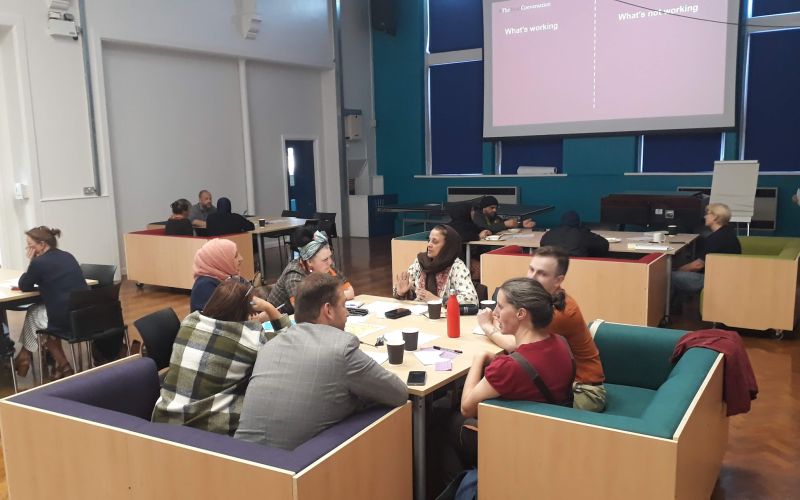blog
Problems diagnosed and solutions found at our 'Keighley Food Conversation'
On 16th of September, EALC and the Food Farming and Countryside Commission organised a 'Food Conversation' in Central Keighley
Food is at the centre of some of the biggest challenges we face. Food security, diet-related ill health, the impact on nature and climate of food production, food bank usage, and other related issues are some of the most common and urgent political issues for ordinary people. However, successive UK governments have failed to act boldly on this issue. Our 'Keighley Food Conversation' gives citizens, who live and work in Keighley, an opportunity to demonstrate what they really want from the food system.
This event was part of a national project developed by the Food, Farming and Countryside Commission. Keighley was one of the three Food Conversations taking place in the Bradford District, and the hundreds taking place around the UK.

This event was part of our Act Locally program in Central Keighley which focuses on bringing schools, health practitioners and academic experts together to tackle poor nutrition and food insecurity. Through our convening partnership of educational leaders, voluntary and community sector organisers, frontline service practitioners and academic researchers, EALC aims to understand this issue in the local context more deeply and find out what resources and mechanisms are available locally to help tackle the problem in a more coordinated way. By doing this, Act Locally will mean that we can work collectively to provide a joined-up solution for pupils, parents and communities.
The Keighley Food Conversation gave citizens who work and live in Central Keighley the opportunity to:
- Be part of a UK-wide conversation about food
- Create connections, build relationships and understand their community better
- Contribute to a push for food system change
- Support people around them to become more active in shaping the future of food
Feedback from the event
Our 'Keighley Food Conversation' led to a productive and wide-ranging discussion between representatives from local schools, health and social care, public health, youth services and more. There were a number of key results the came from this consultation:
- When asked about their overall opinion on the food system, 72% of responses said that it was not working compared to 28% that said it was.
- The three groups that attendees felt were most responsible for changing the food system for the better were community action groups, central government, and parents and individuals.
- Attendees collectively agreed on five recommendations for how to change the food system for the better:
- The first was asking for central government to make high-level changes as it was agreed that personal responsibility has been overstated and systematic change is required.
- The second recommendation was that self-organised groups of citizens must play an important role in reforming the food system. Community action groups can make local, low-level changes. They have the long-term vision which central government often lacks, and can act quickly so that people’s needs are actually met.
- Thirdly, supermarkets to be mandated to prioritise social good as well as profit making. For example, legislation which requires supermarket branches to invest a certain amount of revenue into local areas.
- As well as this, young people should be at the centre of any changes to the food system. We need to work to improve their awareness and knowledge so that they can make the right choices about food.
- Finally, environmental factors must be considered for long-term change to the food system. For example, planning legislation should be changed so that developers are required to build more green space. This will change how we engage with the Food system.
